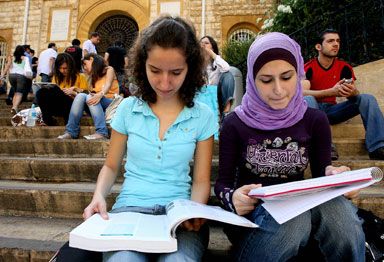 By Hiedeh Farmani
By Hiedeh Farmani
Looks like it is never going to end. We are doomed to live in chaos," lamented her friend Rawan.
Many students fear that the unleashing of a sectarian conflict will threaten their safe haven, where political debate is hot but has hardly turned violent.
The AUB prides itself on being a "non-sectarian institution" and its zero-tolerance towards violence is said to be crucial to keeping hot-blooded party fanatics at bay.
"Lebanese campuses are heavily politicized and polarized, there is always this dynamic of ‘us and them’," said Roula Hajjar, a political science student, referring to Lebanon’s confessional diversity, which determines the distribution of power.
For the moment there is little outward evidence of tension on the campus, where students stroll in the lush gardens overlooking the Mediterranean, huddle over math problems or play cards in between classes.
Notice boards are covered in concert posters and upcoming sporting events.
But Ammar Kerim fears friends turn to enemies overnight if rival politicians fail to work it out.
"People can easily be manipulated, the (civil) war leaders are back and there are already too many guns out there," said the civil engineering senior, hanging out with classmates from Muslim and Christian faiths.
"It will be difficult to stay neutral. You have to be with somebody."
Eating quietly on his own in the school cafeteria, Nadim Abillama said he could not care less who became president.
"People are frustrated, they’d better pick somebody soon and be done with it," said the 19-year-old who is majoring in economics. "This country has serious problems. Poverty is what they should care about as it leads to extremism."
Nadim says he still has hope in Lebanon, but does not feel the country can in the near future heal its wounds "which are linked with the Israeli-Palestinian question."
Like many others he is planning to find work abroad in Saudi Arabia or the Gulf where he will be "well-paid and safe."
Lebanese universities have long been exporters of professionals but instability and dwindling foreign investment heighten the brain drain, AUB’s chairman of political science department, Hilal Khashan said.
"The crisis is an obstacle between them and their bright future," he said. "When the political process is insensitive to the youth’s aspiration their immediate reaction is to get the hell out of here."
Yet he is optimistic about an ending to the current crisis.
"It is Lebanese cliff hanger politics, people brace for the worse, but the agreement comes in the end," he said, insisting politicians have learned from past mistakes.



